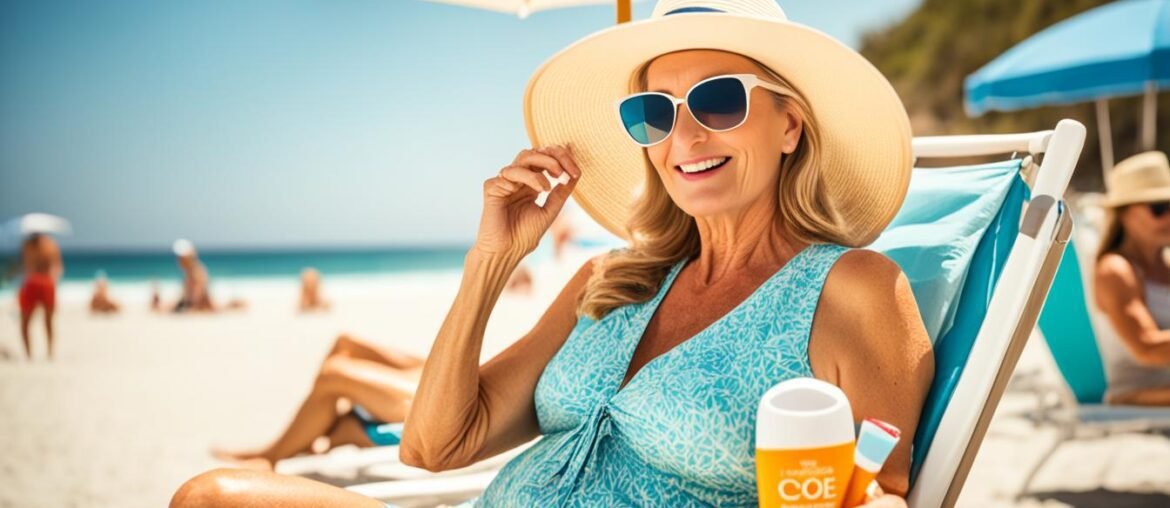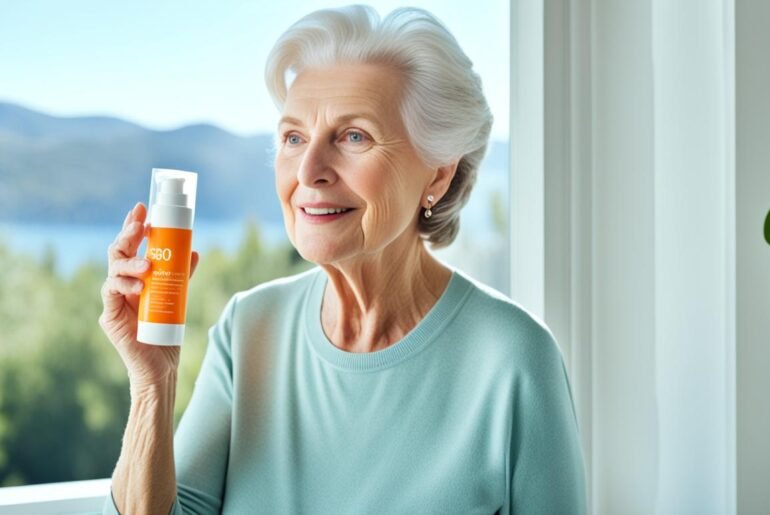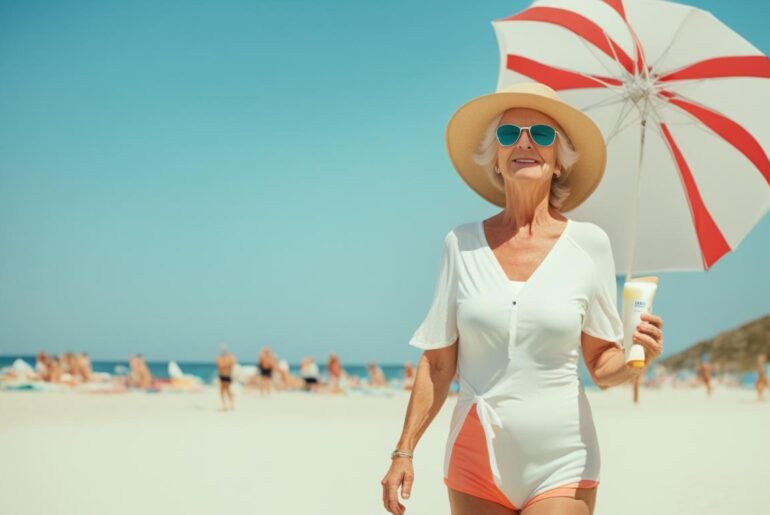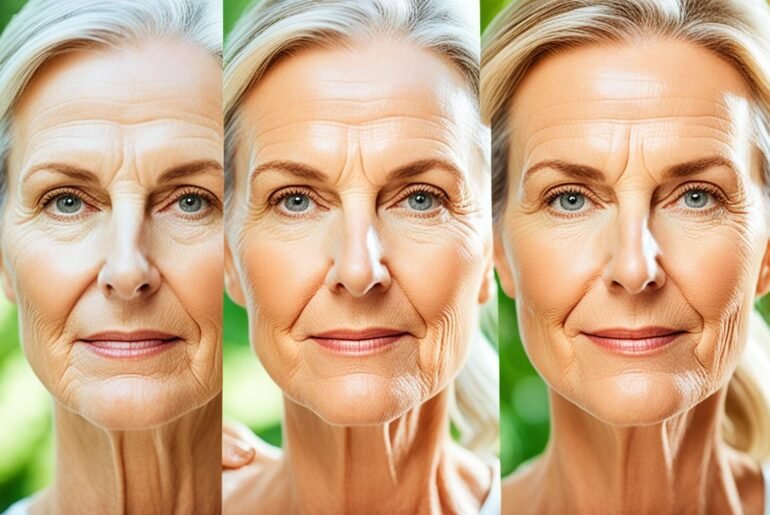Did you know that daily use of broad-spectrum sunscreen can reduce signs of skin aging by 24%? It’s not just about preventing sunburns and skin cancer; sunscreen also plays a crucial role in protecting the skin against aging caused by UV rays. The American Academy of Dermatology recommends using sunscreen every day, as the sun emits harmful rays year-round, including on cloudy days.
Key Takeaways:
- Daily use of broad-spectrum sunscreen can reduce signs of skin aging by 24%.
- The sun emits harmful rays year-round, so sunscreen should be used every day.
- UV rays can lead to various signs of aging and increase the risk of skin cancers.
- Choosing a broad-spectrum sunscreen with a minimum SPF of 30 is recommended for effective sun protection.
- In addition to sunscreen, other measures like staying in the shade and wearing protective clothing can further reduce the risk of sun damage.
The Effects of Sun Exposure on Aging Skin
Sun exposure can have detrimental effects on aging skin. The damaging effects of UV rays can lead to various signs of aging. Here are some of the effects of sun exposure on the skin:
- Depletion of collagen: UV rays break down collagen, a protein responsible for maintaining skin elasticity. As collagen diminishes, the skin loses its firmness and wrinkles become more noticeable.
- Dilation of blood vessels: Prolonged sun exposure can cause blood vessels to dilate, resulting in the appearance of spider veins or redness on the skin.
- Increased prominence of brown pigment: Sun exposure can lead to the overproduction of melanin, the pigment responsible for skin color. This can result in the development of dark spots or uneven skin tone.
- Development of elastotic material: Elastotic material, also known as solar elastosis, is a buildup of abnormal elastic tissue in the skin. It causes the skin to become thick, rough, and develop a cobblestone-like texture.
Furthermore, sun exposure weakens the skin’s immune response, making it more susceptible to the growth of abnormal cells and skin cancers. It is crucial to protect mature skin from the damaging effects of the sun to maintain a youthful appearance.
The Importance of Broad-Spectrum Sunscreen
Protecting your mature skin from sun damage requires an effective sunscreen that offers broad-spectrum protection. Broad-spectrum sunscreen shields your skin from both types of harmful UV rays: UVB rays that cause sunburns, and UVA rays that lead to aging and increase the risk of skin cancers.
When selecting a sunscreen, ensure it provides broad-spectrum protection and has a minimum Sun Protection Factor (SPF) of 30. This level of SPF blocks about 97% of UV rays, significantly reducing the potential damage to your mature skin.
Remember that UVA rays are prevalent year-round, even on cloudy days. Therefore, daily use of broad-spectrum sunscreen is essential in your sun protection routine to prevent sun damage and maintain the health and appearance of your mature skin.
| Key Points | Benefits |
|---|---|
| Effective protection against both UVB and UVA rays | Minimizes the risk of sunburns, premature aging, and skin cancers |
| Minimum SPF 30 | Blocks approximately 97% of harmful UV rays |
| Comprehensive sun protection | Preserves the health and appearance of mature skin |
Using a broad-spectrum sunscreen with an adequate SPF is a vital step in preventing sun damage and protecting your mature skin from the harmful effects of UV rays. Combine sunscreen with other sun protection measures to enhance your overall skin health.
Other Sun Protection Measures
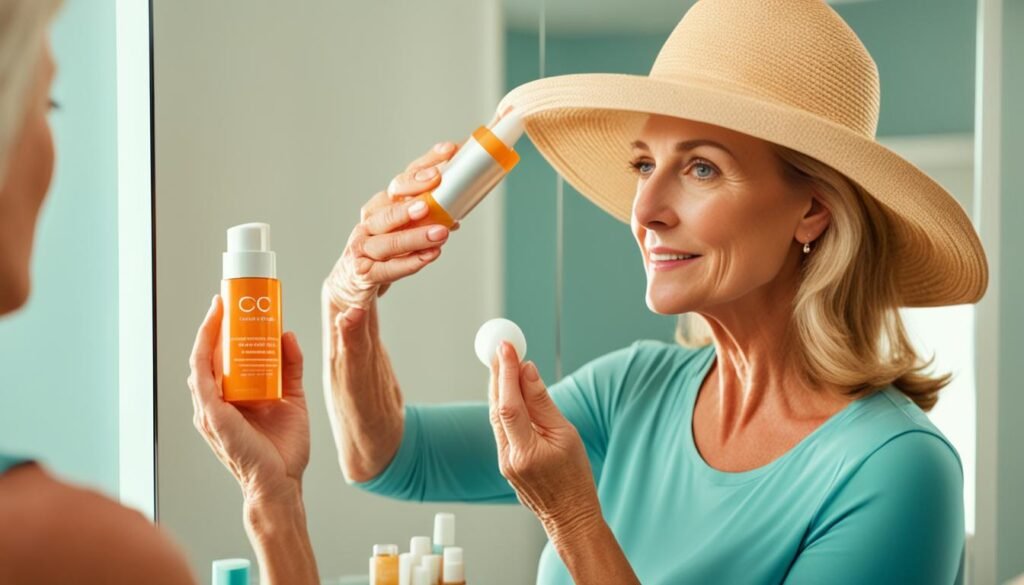
In addition to regular sunscreen use, there are other measures you can take to protect your skin from sun damage. By incorporating these preventive measures into your daily routine, you can effectively safeguard your mature skin and maintain its health and appearance.
Avoid Peak Sun Hours
One of the most effective ways to protect your skin from the harmful effects of the sun is to avoid direct sunlight during peak hours. The UV index is at its highest between 10 a.m. and 4 p.m., making this period the most dangerous for unprotected exposure. Remember to plan your outdoor activities accordingly and seek shade whenever possible.
Wear Protective Clothing
Another important preventive measure is to wear protective clothing that covers your exposed skin. Opt for lightweight, long-sleeved shirts, pants, and broad-brimmed hats to shield yourself from harmful UV rays. Additionally, consider using clothing with built-in UPF (Ultraviolet Protection Factor) for enhanced sun protection.
Seek Shade
Seeking shade is crucial when spending time outdoors. Whether you’re at the beach, a park, or enjoying a picnic, make an effort to find shaded areas. This simple step can significantly reduce your exposure to harmful UV rays and minimize the risk of sun damage.
Remember, protecting your skin from the sun goes beyond sunscreen application. Incorporating these additional preventive measures into your routine will help safeguard your mature skin, keeping it healthy and youthful for years to come.
Comparison of Sun Protection Measures
| Sun Protection Measure | Benefits |
|---|---|
| Avoiding peak sun hours | Reduces direct exposure to harmful UV rays |
| Wearing protective clothing | Provides physical barrier against UV rays |
| Seeking shade | Minimizes direct sun exposure during outdoor activities |
Advances in Anti-Aging Skin Care
As we age, our skin undergoes various changes that contribute to visible signs of aging. Fortunately, advancements in the field of skincare have brought forth a range of treatments that can help combat these signs and restore a more youthful appearance. From topical medications to innovative light therapies and laser treatments, there are several options available to address common concerns such as fine lines, brown spots, and broken blood vessels.
One of the key benefits of these advancements is their ability to target specific skin concerns and deliver noticeable results. For example, topical medications containing retinoids have been proven effective in smoothing fine lines and improving overall skin texture. Light therapies, such as intense pulsed light (IPL), harness the power of light energy to fade away brown spots and even out skin tone. And laser treatments, such as fractional laser resurfacing, stimulate collagen production and reduce the appearance of wrinkles.
These advanced treatments can be highly effective in rejuvenating aging skin. However, it is important to note that they work best when incorporated into a comprehensive skincare routine that includes regular sun protection and proper skincare habits.
While these treatments offer promising results, it’s essential to remember that prevention is always better than cure. Anti-aging skincare should start with a solid foundation of sun protection to prevent further damage. Using broad-spectrum sunscreen daily, along with protective clothing and seeking shade during peak sun hours, is crucial for maintaining the health and youthfulness of aging skin.
Incorporating these advances in anti-aging skincare into your daily routine, along with a personalized skincare regimen recommended by a dermatologist, can help you achieve and maintain a youthful complexion.
Advancements in Anti-Aging Skin Care
| Treatment | Benefits |
|---|---|
| Topical Medications (Retinoids) | – Smoothes fine lines – Improves skin texture |
| Light Therapies (IPL) | – Fades brown spots – Evens out skin tone |
| Laser Treatments (Fractional Laser Resurfacing) | – Stimulates collagen production – Reduces the appearance of wrinkles |
The Role of Hormone Replacement Therapy
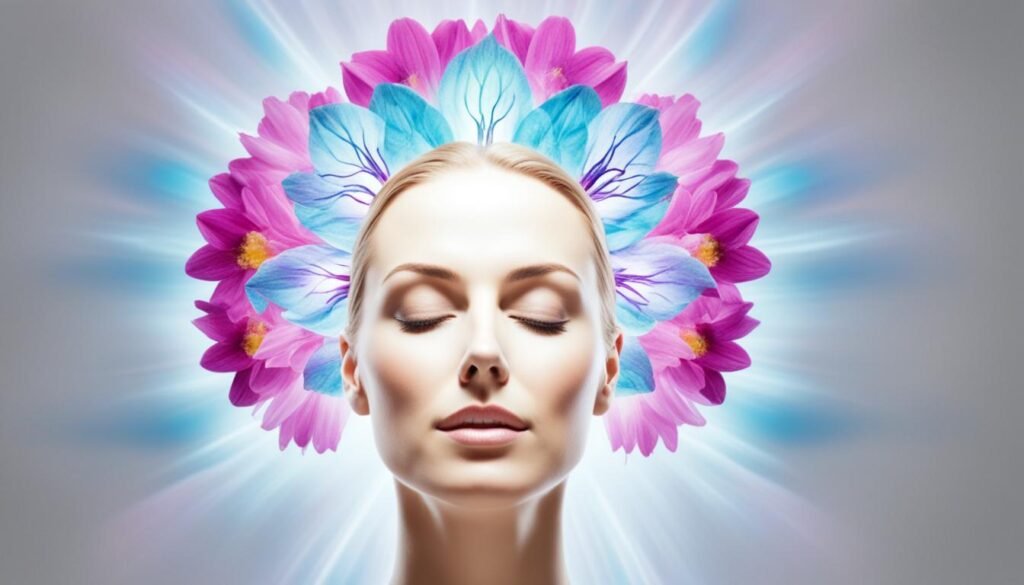
When it comes to aging skin care, hormone replacement therapy (HRT) has emerged as a potential solution. Studies have indicated that HRT can have a positive impact on the skin’s aging process, offering a range of benefits for those seeking to address signs of aging.
One significant effect of HRT is its ability to improve collagen production, a vital component for maintaining youthful skin. Collagen provides the skin with elasticity and firmness, and its depletion is often associated with the development of wrinkles and sagging skin. By promoting collagen synthesis, HRT can help minimize these visible signs of aging.
Estrogen, a hormone commonly replaced during HRT, plays a crucial role in maintaining youthful skin. It helps regulate the production of collagen and hyaluronic acid, a key molecule for maintaining skin hydration and volume. As estrogen levels decline with age, the skin becomes more prone to dryness and increased signs of aging. By restoring estrogen levels through HRT, individuals may experience improvements in skin texture, hydration, and overall radiance.
It is important to note that hormone replacement therapy should always be approached under the guidance of a dermatologist or healthcare provider. They will evaluate an individual’s specific needs, consider their medical history, and recommend the most suitable course of treatment. HRT is not suitable for everyone and may carry certain risks and side effects, so a personalized approach is essential to ensure safety and effectiveness.
By considering hormone replacement therapy as part of an aging skin care routine, individuals can explore a potential avenue to address signs of aging and maintain youthful and healthy-looking skin.
Benefits of Hormone Replacement Therapy for Aging Skin
| Benefit | Description |
|---|---|
| Improved Collagen Production | HRT stimulates collagen synthesis, reducing the appearance of wrinkles and sagging skin. |
| Enhanced Skin Hydration | Restoring estrogen levels through HRT helps maintain skin hydration and reduce dryness. |
| Radiant Skin Texture | HRT can improve the overall texture of the skin, making it smoother and more vibrant. |
The Impact of Lifestyle Factors on Aging
In addition to proper sun protection, several lifestyle factors can significantly influence the aging process of your skin. Factors such as smoking, poor diet, lack of exercise, and chronic stress can contribute to premature aging and exacerbate the appearance of fine lines, wrinkles, and skin dullness.
Smoking: Smoking is not only detrimental to your overall health but also has a profound impact on the skin. It accelerates the breakdown of collagen and elastin, which are responsible for maintaining skin elasticity and firmness. The repetitive facial expressions made while smoking, such as pursing the lips and squinting the eyes, can also contribute to the formation of wrinkles.
Poor Diet: A diet lacking in essential nutrients and antioxidants can deprive your skin of the nourishment it needs to maintain its vitality. Consuming excessive amounts of processed foods, sugary snacks, and beverages can lead to increased inflammation and oxidative stress, further accelerating the aging process. Incorporating a balanced diet rich in fruits, vegetables, whole grains, lean proteins, and healthy fats can provide the necessary nutrients to support healthy skin.
Lack of Exercise: Regular exercise not only benefits your overall health and weight management but also boosts the circulation of oxygen and nutrients to the skin cells. Increased blood flow helps nourish the skin and promote a healthy complexion. Additionally, exercise helps reduce stress, which can have a positive impact on your skin’s overall appearance.
Chronic Stress: Prolonged periods of stress can disrupt the balance of hormones in your body, leading to a variety of skin concerns. Stress can trigger inflammation, compromise the skin’s barrier function, and contribute to the development of conditions such as acne, eczema, and psoriasis. Incorporating stress management techniques like meditation, yoga, and regular self-care practices can help mitigate the effects of stress on your skin.
Adopting a healthy lifestyle, incorporating regular exercise, maintaining a balanced diet, managing stress effectively, and avoiding harmful habits like smoking can significantly impact the aging process of your skin. By prioritizing these anti-aging tips and incorporating them into your skincare routine for aging skin, you can help maintain a youthful and vibrant complexion.
The Importance of Antioxidants in Skin Care
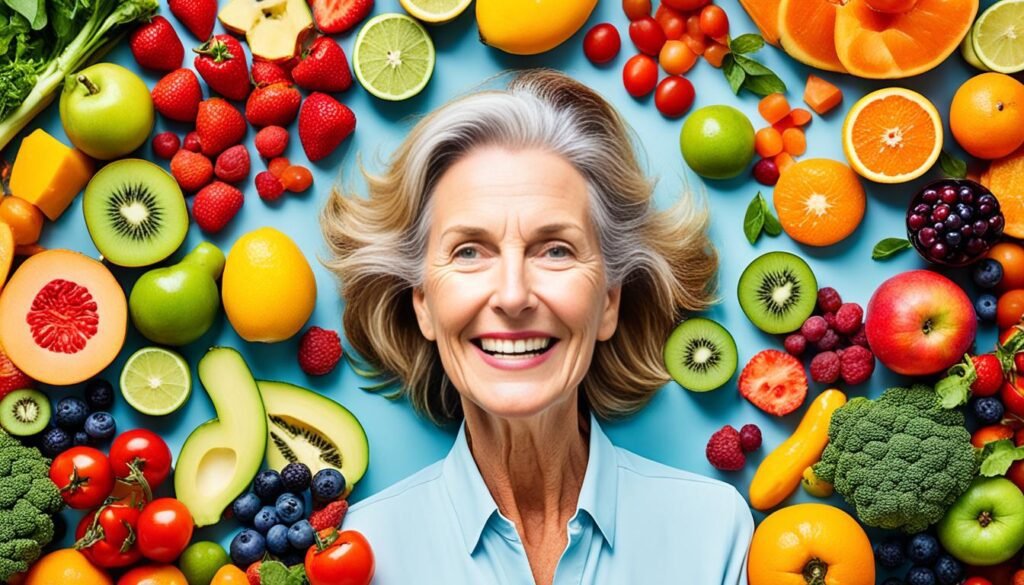
Antioxidants play a crucial role in maintaining the health and vitality of your skin as it ages. These powerful compounds help neutralize free radicals, unstable molecules that can cause oxidative stress and damage to skin cells. By including antioxidants in your daily skincare routine, you can protect your skin from environmental aggressors and reduce the visible signs of aging.
When it comes to choosing skincare products with antioxidant properties, look for ingredients like:
- Vitamins C and E: These vitamins are known for their potent antioxidant properties. Vitamin C helps brighten the skin and improve collagen production, while vitamin E provides deep hydration and protection against free radicals.
- Green tea extract: Green tea is rich in antioxidants called catechins, which help fight inflammation and protect against UV damage. Look for products that contain green tea extract for its soothing and rejuvenating properties.
- Resveratrol: Found in red grapes and berries, resveratrol is a powerful antioxidant that can help reduce the appearance of fine lines and wrinkles. It also has anti-inflammatory benefits, making it an excellent ingredient for aging skin.
By incorporating antioxidant-rich products into your skincare routine, you can enhance the overall health and appearance of your skin. These ingredients work to counteract the effects of environmental stressors and promote a more youthful complexion.
Remember, maintaining a consistent skincare routine that includes antioxidants is key to reaping their benefits. Apply products containing these ingredients morning and night for optimal results. Your skin will thank you!
The Efficacy of Anti-Wrinkle Ingredients
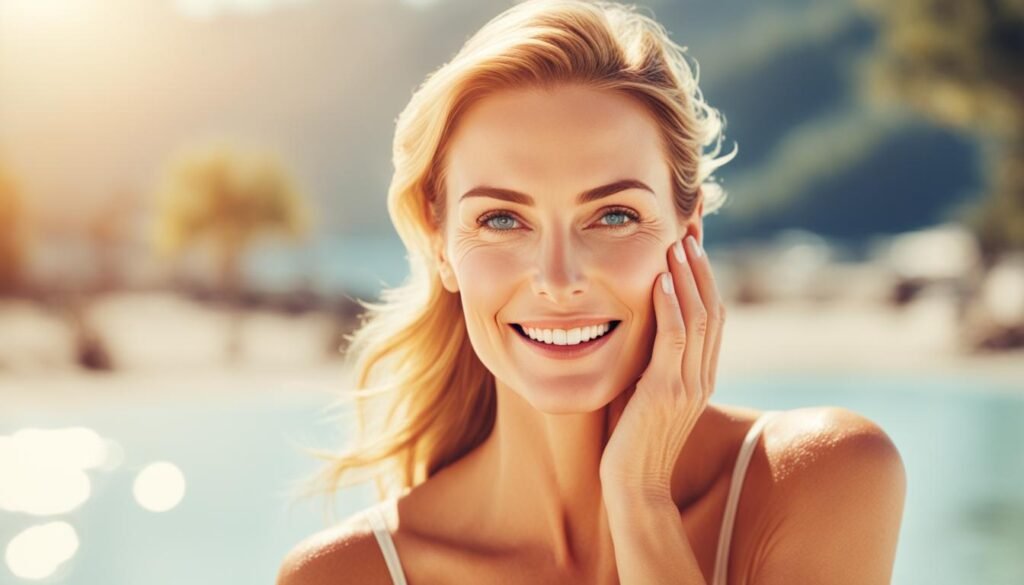
When it comes to reducing wrinkles and fine lines, not all skincare products are created equal. With a plethora of options available in the market, it’s essential to know which ingredients have been scientifically proven to be effective in improving skin appearance and reducing the signs of aging.
One key ingredient to look out for is retinol. It is a derivative of vitamin A and has been widely studied for its anti-aging properties. Retinol works by stimulating collagen production, reducing the appearance of wrinkles, and improving skin texture and tone.
Another effective ingredient is peptides. Peptides are short chains of amino acids that help boost collagen production, promoting firmer and smoother skin. They can also improve elasticity and hydration, resulting in a plumper and more youthful complexion.
Hyaluronic acid is also an important ingredient to consider in anti-aging skincare. It is a naturally occurring substance in the skin that helps retain moisture, keeping the skin hydrated and plump. By replenishing hyaluronic acid levels, it can help reduce the appearance of fine lines and wrinkles.
When choosing anti-aging products, it is crucial to look for these key ingredients. They have been scientifically proven to deliver visible results in improving skin texture, reducing wrinkles, and maintaining a youthful appearance. However, it’s important to note that individual results may vary, and consulting with a dermatologist can provide personalized recommendations based on your specific skincare needs.
| Ingredient | Benefits |
|---|---|
| Retinol | Stimulates collagen production, reduces wrinkles, improves skin texture and tone |
| Peptides | Boosts collagen production, promotes firmer and smoother skin, improves elasticity and hydration |
| Hyaluronic Acid | Retains moisture, keeps skin hydrated and plump, reduces the appearance of fine lines and wrinkles |
Understanding Sunscreen and its Benefits
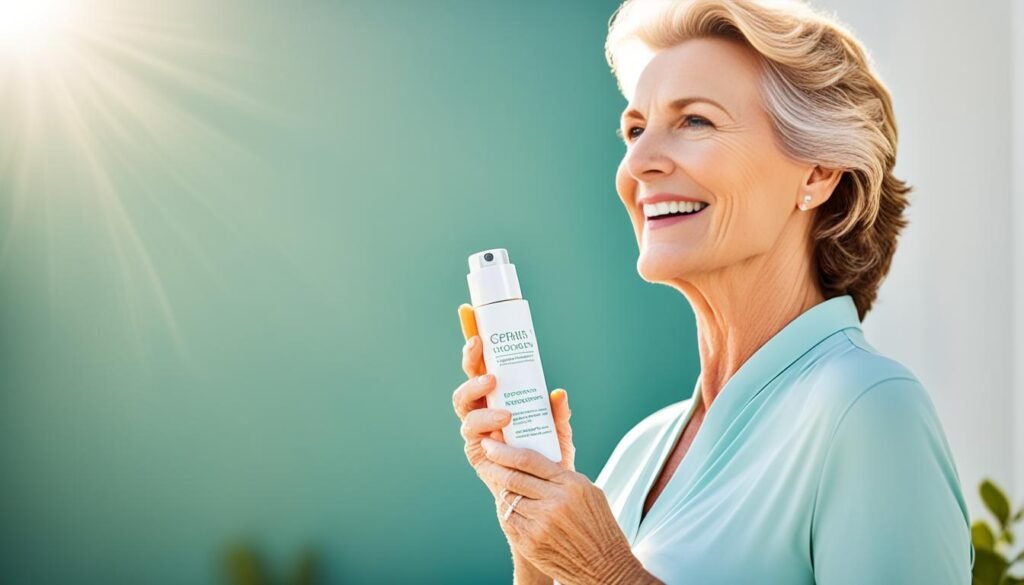
As we age, protecting our skin becomes increasingly important. Sunscreen is a vital component of any skincare routine, especially for mature skin. It not only helps prevent sunburns but also provides protection against skin cancer and the signs of aging caused by harmful UV rays.
Sunscreen works by either absorbing or reflecting the sun’s rays, preventing them from penetrating the skin. This acts as a physical barrier, shielding the skin from damage. By applying sunscreen regularly and properly, you can significantly reduce the risk of sun damage and maintain youthful-looking skin.
Using a broad-spectrum sunscreen is essential for comprehensive protection. These sunscreens protect against both UVB rays, which cause sunburns, and UVA rays, responsible for premature aging and skin cancer development.
Let’s take a closer look at the benefits of sunscreen:
- Preventing sunburns: Sunburns not only cause discomfort but also contribute to long-term skin damage. Applying sunscreen with a high SPF can help prevent painful sunburns, especially during prolonged sun exposure.
- Reducing the risk of skin cancer: The damaging effects of UV radiation can lead to the development of skin cancer. By regularly applying sunscreen, you can lower your risk and protect your skin from harmful UV rays.
- Preventing premature aging: UV rays can accelerate the aging process, leading to wrinkles, fine lines, and age spots. By incorporating sunscreen into your daily routine, you can help maintain a youthful appearance and minimize the visible signs of aging.
Remember, sunscreen should be an essential part of your sun protection strategy, along with other preventive measures such as wearing protective clothing and seeking shade. By being proactive about sun protection, you can enjoy healthier and more radiant skin.
The Benefits of Sunscreen at a Glance
| Benefits | |
|---|---|
| 1 | Prevents sunburns |
| 2 | Reduces the risk of skin cancer |
| 3 | Prevents premature aging |
Choosing the Right Sunscreen
When it comes to protecting mature skin from the harmful effects of the sun, choosing the right sunscreen is essential. A broad-spectrum formula that offers protection against both UVB and UVA rays is ideal. This ensures that your skin is shielded from both sunburns and the aging effects caused by the sun.
When selecting sunscreen, look for a minimum SPF of 30. This provides adequate protection against the sun’s harmful rays. Higher SPF values can offer even more protection, especially if you spend extended periods in the sun.
Consider your skin type and specific concerns when choosing sunscreen. For oily skin, opt for a lightweight formula that won’t clog pores or cause greasiness. If you have dry skin, choose a moisturizing formula that helps hydrate and nourish the skin.
Remember to apply sunscreen generously to ensure proper coverage. Don’t forget to cover often overlooked areas such as the ears, the back of the neck, and the tops of the feet. Reapply sunscreen every two hours or after swimming or sweating, as it can wear off over time.
By selecting the right sunscreen and following proper application and reapplication guidelines, you can effectively protect your mature skin from sun damage and maintain its health and youthful appearance.
Conclusion
Protecting your skin from sun damage is essential in maintaining youthful and healthy-looking skin. By following a comprehensive skincare routine and incorporating sun protection measures into your daily life, you can prevent premature aging and reduce the risk of skin cancer.
One of the most crucial steps in sun protection for aging skin is the regular use of broad-spectrum sunscreen. Apply a broad-spectrum sunscreen with a minimum SPF of 30 every day, regardless of the weather. This will shield your skin from both harmful UVB rays that cause sunburns and UVA rays that lead to aging and skin cancer.
In addition to sunscreen, consider other sun protection measures such as avoiding peak sun hours, seeking shade, and wearing protective clothing. These practices further reduce the risk of sun damage and help maintain the health and appearance of aging skin.
For personalized guidance on protecting your aging skin from the sun, consult with a dermatologist who can recommend the best sun protection practices for your specific needs. Together with a comprehensive skincare routine, you can achieve long-lasting results and keep your skin looking radiant and youthful.
FAQ
What are some sun protection tips for aging skin?
Some sun protection tips for aging skin include using broad-spectrum sunscreen daily, staying out of the sun during peak hours, wearing protective clothing, and seeking shade during outdoor activities.
How does sun exposure affect aging skin?
Sun exposure can lead to various signs of aging, such as the depletion of collagen, dilation of blood vessels, increased prominence of brown pigment in the skin, and the development of elastotic material. It also diminishes the skin’s immune response, which can allow early abnormal cells to grow into cancer.
Why is broad-spectrum sunscreen important for mature skin?
Broad-spectrum sunscreen is important for mature skin because it protects against both UVB rays, which cause sunburns, and UVA rays, which lead to aging and the development of skin cancers.
What are some other sun protection measures for mature skin?
Other sun protection measures for mature skin include staying out of the sun during peak hours, wearing protective clothing like long-sleeved shirts and hats, and seeking shade during outdoor activities to reduce the risk of sun damage.
What advancements are there in anti-aging skin care?
Advancements in anti-aging skin care include topical medications, light therapies, and laser treatments which have shown efficacy in improving fine lines, brown spots, and broken blood vessels.
Does hormone replacement therapy have an impact on aging skin?
Yes, hormone replacement therapy (HRT) has been shown to have a positive impact on the skin’s aging process. Studies have found that HRT can improve collagen production and reduce some signs of aging.
How do lifestyle factors influence the skin’s aging process?
Lifestyle factors such as smoking, poor diet, lack of exercise, and stress can contribute to premature aging. Adapting a healthy lifestyle with regular exercise, a balanced diet, adequate hydration, and stress management can help maintain youthful skin.
What is the role of antioxidants in skin care?
Antioxidants neutralize free radicals that contribute to oxidative stress and damage cells. Including antioxidants in your skincare routine can protect the skin from environmental aggressors and reduce the signs of aging.
What anti-wrinkle ingredients are effective for reducing signs of aging?
Retinol, peptides, and hyaluronic acid have been scientifically proven to help improve the appearance of skin and reduce the signs of aging. Look for products containing these ingredients.
Why is sunscreen important for aging skin?
Sunscreen is vital for aging skin as it helps protect against sunburns, skin cancer, and the signs of aging caused by UV rays. Regular and proper use of sunscreen can significantly reduce the risk of sun damage and maintain youthful skin.
How do I choose the right sunscreen for mature skin?
When selecting a sunscreen for mature skin, opt for a broad-spectrum formula that offers protection against both UVB and UVA rays. Consider your skin type and specific concerns when choosing a sunscreen and apply generously, reapplying every two hours or after swimming or sweating.
What are some sun protection tips for aging skin?
Some sun protection tips for aging skin include using broad-spectrum sunscreen daily, staying out of the sun during peak hours, wearing protective clothing, and seeking shade during outdoor activities.

